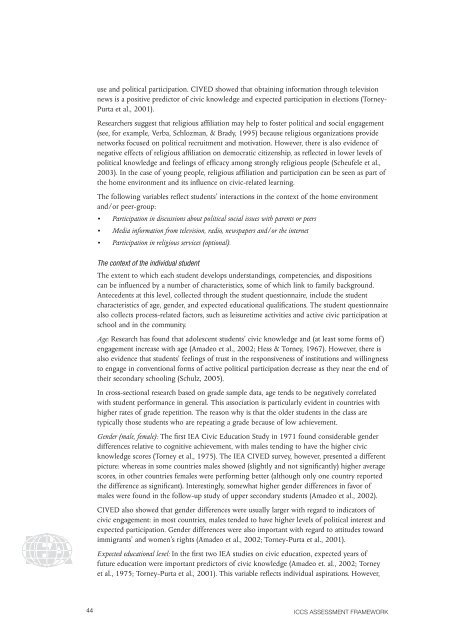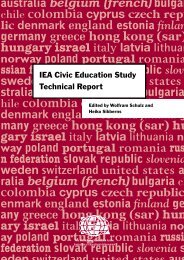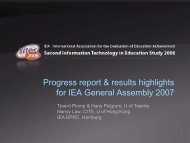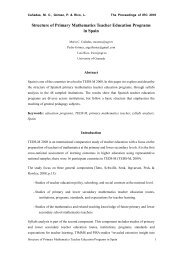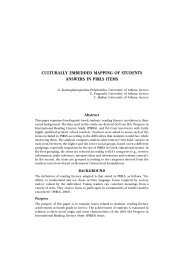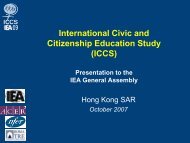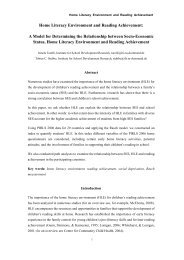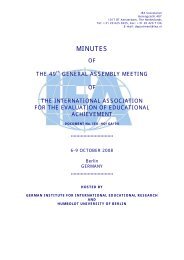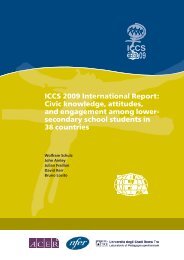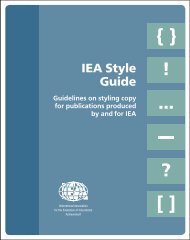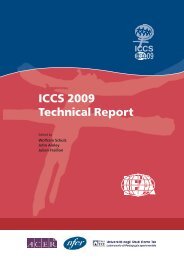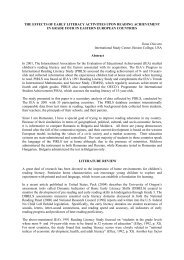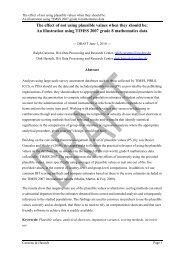International civic and citizenship education study - iccs - IEA
International civic and citizenship education study - iccs - IEA
International civic and citizenship education study - iccs - IEA
- TAGS
- civic
- citizenship
- iccs
- www.iea.nl
You also want an ePaper? Increase the reach of your titles
YUMPU automatically turns print PDFs into web optimized ePapers that Google loves.
use <strong>and</strong> political participation. CIVED showed that obtaining information through television<br />
news is a positive predictor of <strong>civic</strong> knowledge <strong>and</strong> expected participation in elections (Torney-<br />
Purta et al., 2001).<br />
Researchers suggest that religious affiliation may help to foster political <strong>and</strong> social engagement<br />
(see, for example, Verba, Schlozman, & Brady, 1995) because religious organizations provide<br />
networks focused on political recruitment <strong>and</strong> motivation. However, there is also evidence of<br />
negative effects of religious affiliation on democratic <strong>citizenship</strong>, as reflected in lower levels of<br />
political knowledge <strong>and</strong> feelings of efficacy among strongly religious people (Scheufele et al.,<br />
2003). In the case of young people, religious affiliation <strong>and</strong> participation can be seen as part of<br />
the home environment <strong>and</strong> its influence on <strong>civic</strong>-related learning.<br />
The following variables reflect students’ interactions in the context of the home environment<br />
<strong>and</strong>/or peer-group:<br />
• Participation in discussions about political social issues with parents or peers<br />
• Media information from television, radio, newspapers <strong>and</strong>/or the internet<br />
• Participation in religious services (optional).<br />
The context of the individual student<br />
The extent to which each student develops underst<strong>and</strong>ings, competencies, <strong>and</strong> dispositions<br />
can be influenced by a number of characteristics, some of which link to family background.<br />
Antecedents at this level, collected through the student questionnaire, include the student<br />
characteristics of age, gender, <strong>and</strong> expected <strong>education</strong>al qualifications. The student questionnaire<br />
also collects process-related factors, such as leisuretime activities <strong>and</strong> active <strong>civic</strong> participation at<br />
school <strong>and</strong> in the community.<br />
Age: Research has found that adolescent students’ <strong>civic</strong> knowledge <strong>and</strong> (at least some forms of )<br />
engagement increase with age (Amadeo et al., 2002; Hess & Torney, 1967). However, there is<br />
also evidence that students’ feelings of trust in the responsiveness of institutions <strong>and</strong> willingness<br />
to engage in conventional forms of active political participation decrease as they near the end of<br />
their secondary schooling (Schulz, 2005).<br />
In cross-sectional research based on grade sample data, age tends to be negatively correlated<br />
with student performance in general. This association is particularly evident in countries with<br />
higher rates of grade repetition. The reason why is that the older students in the class are<br />
typically those students who are repeating a grade because of low achievement.<br />
Gender (male, female): The first <strong>IEA</strong> Civic Education Study in 1971 found considerable gender<br />
differences relative to cognitive achievement, with males tending to have the higher <strong>civic</strong><br />
knowledge scores (Torney et al., 1975). The <strong>IEA</strong> CIVED survey, however, presented a different<br />
picture: whereas in some countries males showed (slightly <strong>and</strong> not significantly) higher average<br />
scores, in other countries females were performing better (although only one country reported<br />
the difference as significant). Interestingly, somewhat higher gender differences in favor of<br />
males were found in the follow-up <strong>study</strong> of upper secondary students (Amadeo et al., 2002).<br />
CIVED also showed that gender differences were usually larger with regard to indicators of<br />
<strong>civic</strong> engagement: in most countries, males tended to have higher levels of political interest <strong>and</strong><br />
expected participation. Gender differences were also important with regard to attitudes toward<br />
immigrants’ <strong>and</strong> women’s rights (Amadeo et al., 2002; Torney-Purta et al., 2001).<br />
Expected <strong>education</strong>al level: In the first two <strong>IEA</strong> studies on <strong>civic</strong> <strong>education</strong>, expected years of<br />
future <strong>education</strong> were important predictors of <strong>civic</strong> knowledge (Amadeo et. al., 2002; Torney<br />
et al., 1975; Torney-Purta et al., 2001). This variable reflects individual aspirations. However,<br />
44 ICCS ASSeSSment FrAmework


